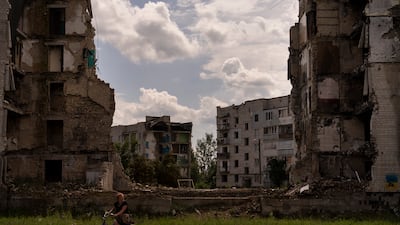Representatives from about 40 countries are expected to fly to Saudi Arabia at the weekend to discuss how to end the war in Ukraine.
While the summit, which excludes Russia, has no clear deliverables, the outcomes may be important for Ukraine, which is testing the ground ahead of an expected global peace summit later this year.
A significant attendance of delegates from the Global South at the meeting would be a diplomatic win for Kyiv, which is eager to convince as many countries as possible to rally behind its 10-point peace plan, analysts have told The National.
Saudi Arabia, with its strong relations with both western countries and China, is viewed as a “good place” for countries from across the globe to engage, said Dmytro Kryvosheiev, a visiting fellow at the European Council on Foreign Relations think tank.
“In the last few months, Ukrainian political leaders significantly increased communication efforts with their counterparts from Latin America, Africa, the Middle East and South-east Asia,” said Mr Kryvosheiev in an email.
Food security, which is part of the peace plan put forward by Ukrainian President Volodymyr Zelenskyy in November, is a key topic of engagement between Ukraine and the rest of the world.
Russia last month withdrew from a UN-Turkey-brokered deal that enabled Ukrainian grain exports via the Black Sea, sending Europe scrambling to find alternative routes.
Before the war, a fifth of the world’s barley came from Ukraine, as well as a sixth of its corn and an eighth of its wheat.
Ukraine’s appeals for the route to be reopened have been backed by the West.
In a letter sent last week to G20 foreign ministers viewed by The National, EU foreign and security chief Josep Borrell said Russia’s agriculture sector was the main beneficiary of the Kremlin’s decision to exit the grain deal.
Russian agricultural exports are thriving, said Mr Borrell, who condemned Moscow’s “cynical policy of deliberating using food as a weapon to create new dependencies by exacerbating economic vulnerabilities and global food insecurity”.
He urged ministers to speak with a “clear and unified voice” to pressurise Russia to “reconsider and resume its participation in this vital initiative”.
High-level dialogue
In the Saudi coastal town of Jeddah, Ukraine and its allies are likely to target global economic heavyweights such as China, Brazil, India, and Indonesia.
Their support “will be essential for Ukraine to increase international political pressure on Russia”, said Mr Kryvosheiev.
“Ukraine is trying to establish a high-level dialogue with these countries and to find a way to end the war that is fair and sustainable,” said Ivan Ulises Kentros Klyszcz, research fellow at Estonia’s International Centre for Defence and Security.
“It’s important to stress that up until last year Ukraine’s international attention was focused only on Europe and North America. Now, they are doing something they have never attempted before.”
It would be a big win for Ukraine if China, which did not attend a previous round of talks in Denmark in June, sends delegates to the Jeddah talks. Yet analysts view this as unlikely.
“I believe that China would like to have a larger role if it were involved,” said Mr Klyszcz.
Other countries have expressed ambivalence.
Mexico’s President Andres Manuel Lopez Obrado said on Monday he would send representatives only if both Ukraine and Russia had a presence in Jeddah.
Andriy Yermak, Mr Zelenskyy’s chief of staff, answered on Telegram: “This is a forum of responsible states who stand by international rights and the UN statutes. And that's why Russia won't be there.”
Mexico’s posture since the start of the war has been “quite illustrative of many countries in the Global South”, said Mr Klyszcz.
Russia watching
Mexico suggested a peace plan last September that was criticised by the government in Kyiv, which said it favoured Russia by allowing it to retain Ukrainian territory for at least five years. It gained no traction.
Its absence from the Jeddah talks would signal weaker support than hoped for by Ukraine.
The seniority of delegates attending the talks will also be scrutinised.
Fewer than 20 of Africa’s 54 heads of state attended a recent summit in Moscow, compared to 43 at a gathering in 2019. This was widely viewed as a weakening of support for Russian President Vladimir Putin.
Russia has said it will watch the summit closely.
“We need to understand what goals are set and what will be discussed. Any attempt to promote a peaceful settlement deserves a positive evaluation,” Kremlin spokesman Dmitry Peskov said.
Meanwhile, many western countries have confirmed their attendance.
Top western delegates expected in Jeddah include Jake Sullivan, the US national security adviser, and Emmanuel Bonne, diplomatic adviser to French President Emmanuel Macron.
On the EU side, the head of cabinet of the president of the European Commission, Bjoern Seibert, and chief foreign policy adviser of the president of the European Council, Simon Mordue, will attend.
Ukraine hopes the Jeddah talks will be followed by a global “peace summit” later this year.
Mr Zelenskyy on Wednesday said Ukraine was “working hard on making it happen this fall” and it would involve “most of the world’s countries”.


